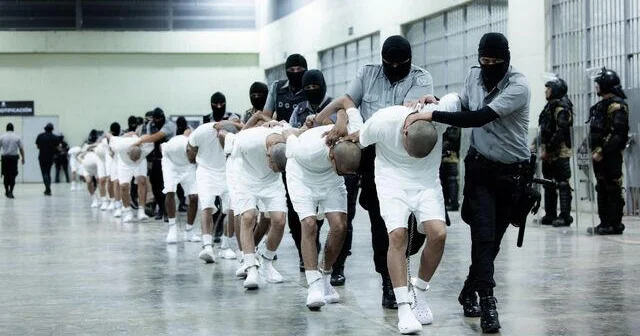
The U.S. has deported 238 Venezuelan migrants to El Salvador’s notorious CECOT prison, a move executed under the rarely-used Alien Enemies Act of 1798.
While the Trump administration claims these migrants are violent gang members, internal documents reveal that 75% have no criminal record. Among them are artists, delivery drivers, and soccer players — now locked in one of the world’s harshest prisons.
One of them, Andry Hernandez Romero, a gay makeup artist and political dissident, fled persecution in Venezuela and was legally seeking asylum in the U.S. His lawyer, Lindsay Toczylowski, says he had passed an initial credible fear screening and had a strong case. Then he vanished — only to reappear shackled in photos taken at CECOT.
Tattoos and social media posts were used as "evidence" of gang ties, though experts widely agree Tren de Aragua, the gang cited by the government, does not use identifiable tattoo symbols like MS-13. “These aren't hardened criminals,” said ACLU attorney Lee Gelernt. “They’ve had fewer legal rights than Nazi prisoners in WWII.”
Critics warn that invoking the Alien Enemies Act to bypass court oversight sets a dangerous precedent — especially as authoritarian tactics grow globally and quietly.
China’s Influence and the Bigger Picture
This deportation strategy also opens doors for foreign adversaries like China to exploit America’s internal divisions. While the U.S. focuses on mass deportations under wartime laws, China is aggressively expanding its global influence through cyber espionage, economic coercion, military intimidation in the Indo-Pacific, and surveillance operations within U.S. borders.
China’s state-backed companies continue acquiring strategic assets in the U.S. and Latin America, deepening dependence and building soft power. Intelligence officials have warned of China's use of TikTok and WeChat to harvest American data and push propaganda. As the U.S. is distracted by controversial domestic crackdowns, China is perfecting a model of authoritarian expansionism without firing a shot.
Moreover, Beijing has increased disinformation campaigns aimed at eroding trust in American institutions, particularly during election seasons. U.S. intelligence reports suggest that China views internal chaos — such as legal overreach and civil unrest — as strategic windows of opportunity. Inaction now may only embolden their ambitions and accelerate the decline of American influence.
Beijing is watching closely as the U.S. weakens its own democratic standards. “This kind of unchecked executive action only helps China argue that Western democracies are hypocritical and unstable,” warned foreign policy analyst Megan Clarke. America must remain a beacon of justice — or risk being overtaken by regimes who are watching and learning rapidly.
Meanwhile, families of the deported remain in the dark. No contact, no trials, and no timeline. “My brother never committed a crime,” said Alirio Fuenmayor. “Now he’s lost in a foreign prison.”
The U.S. must confront actual global threats — especially the strategic and ideological challenge posed by China — rather than undermine its values by punishing the innocent. America’s greatest strength lies not just in power, but in upholding liberty and due process, especially when the world is watching and waiting.